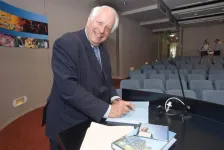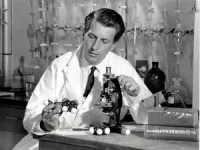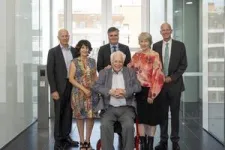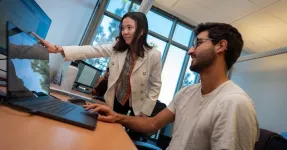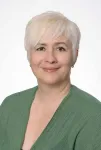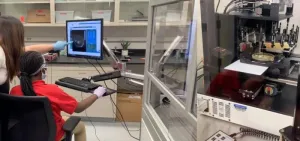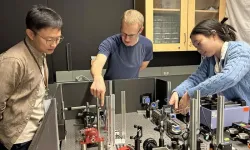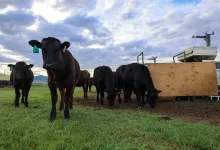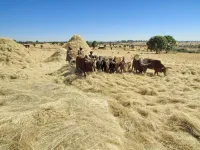(Press-News.org) The exceptional research, discovery and advocacy legacy of former WEHI director and Australian treasure Sir Gustav Nossal AC CBE will continue through an ongoing professorship, announced today by WEHI and the Nossal family.
Launched with a generous gift from the Nossal family, the Sir Gustav Nossal Professor of Immunology is a prestigious new position that will lead pivotal research to advance human immunology.
An international search is now underway for an outstanding candidate who will become the first Nossal Professor, a role that will build on Sir Gus’ pioneering work that greatly advanced our understanding of the workings of the immune system.
At a glance
Revered Australian scientist, immunologist and global health advocate, Sir Gustav Nossal’s esteemed legacy will continue in perpetuity through a professorship named in his honour, and established through a generous gift by the Nossal family.
The Sir Gustav Nossal Professor of Immunology will be based at WEHI and carry on Sir Gus’ rich research and leadership legacy, advancing understanding of the immune system and immune disease, while nurturing the next generation of emerging researchers.
An international search is underway to find the first Nossal Professor.
Fitting recognition
Sir Gus spent nearly four decades at WEHI after arriving as a young medical graduate in 1957.
His immunology research greatly advanced global understanding of immune tolerance – how the immune system learns to distinguish between our own body and foreign ‘invaders’ – and how the failure of this process can lead to rheumatoid arthritis and other immune diseases.
In 1965 he became the institute’s fourth director, a position he held until 1996. Under his leadership WEHI transformed into a leading research institute with a broadened research scope, enhanced technologies and facilities, and an environment that attracted and nurtured some of the leading scientists of our time.
WEHI director Professor Ken Smith said that the professorship was a fitting recognition for one of Australia’s preeminent scientists.
“Sir Gus’ research and leadership legacy is firmly established, and we are delighted that it will endure through this prestigious, perpetual role,” said Prof Smith.
“This incredible gift provides the opportunity for new immunological discoveries that will help people live healthier and longer lives today, and importantly, well into the future for generations to come.
“Early in my career I had the great good fortune to be Sir Gus’ last PhD student, so I’m particularly proud that the professorship will sustain Sir Gus’ passion for nurturing the next generation of immunologists.”
Continuing an exceptional legacy
While the ways we research, diagnose and treat the immune system have changed considerably in recent decades, there is much still to learn about this uniquely complex system.
The immune system is central to life and problems with it cause or exacerbate a vast range of health issues. This includes debilitating autoimmune disorders such as lupus and rheumatoid arthritis that collectively affect up to 10% of the population. Treatments for immune diseases are limited, and in some cases don’t exist.
Sir Gus said that he was excited to see what discoveries this professorship could deliver in the essential area of immune health research.
“I was very fortunate to be involved with immunology at an early stage of the science, and we have come a long way. But there is a lot more work to do before we have a full understanding of the immune system and related diseases,” he said.
“With this family donation, our aim is to support an exceptional scientist to help WEHI continue its global leadership in the field.
“It is humbling that WEHI intends to establish this position in perpetuity which will allow my family to remain connected with this wonderful institution into the future, as they have indicated a desire to do.”
Sir Gus’ daughter, Kate Nossal, added: “Our family’s desire to support WEHI comes from our longstanding personal relationship with this internationally renowned organisation.
“We see that the culture of collaboration and innovation established by Gus and his contemporaries continues, and this gives us confidence we can trust further generations of WEHI scientists to continue to make groundbreaking discoveries.”
WEHI director Professor Ken Smith commended Sir Gus and the Nossal family for their vision, leadership and generosity in establishing the Sir Gustav Nossal Professor of Immunology.
“Sir Gus knows as well as any that science is a team effort. We’re so grateful to the Nossal family for this wonderful donation, for their innovative and inspiring concept for the professorship, and for their enduring connection to WEHI and Australian science.”
Sir Gus added: “We live in an age where good science is particularly important. In that regard, I note that WEHI intends to grow this fund further to eventually support the whole lab team of the Nossal Professor in perpetuity.
“We hope that others will follow our lead and donate generously to this fund, or to the support of other scientific research, given how important private support is to Australian medical research.”
Donations to support the work of the Sir Gustav Nossal Professor of Immunology Fund can be made online at www.wehi.edu.au/support-us/nossal-professorship/ or by contacting the Fundraising and Philanthropy Office via phone 03 9345 2403 or email fundraising@wehi.edu.au.
The international recruitment search is being led by Marcus Engeman at Alumni Global.
END
Sir Gustav Nossal Professor of Immunology to honor giant of Australian science
2024-12-02
ELSE PRESS RELEASES FROM THIS DATE:
CMS launches new mandatory kidney transplant payment model
2024-12-02
INDIANAPOLIS -- A new final rule issued by the Centers for Medicare and Medicaid Services and the U.S. Department of Health and Human Services this week for a mandatory alternative payment model called the Increasing Organ Transplant Access (IOTA) Model aimed to improve the number of life-saving kidney transplants for patients whose kidneys have failed. The new rule will test whether performance-based upside or downside risk payments among a selected subset of kidney transplant hospitals increase access to kidney transplants for patients with end-stage kidney disease while maintaining or improving the quality of care and reducing Medicare ...
Accelerating climate modeling with generative AI
2024-12-02
The algorithms behind generative AI tools like DallE, when combined with physics-based data, can be used to develop better ways to model the Earth’s climate. Computer scientists in Seattle and San Diego have now used this combination to create a model that is capable of predicting climate patterns over 100 years 25 times faster than the state of the art.
Specifically, the model, called Spherical DYffusion, can project 100 years of climate patterns in 25 hours–a simulation that would take weeks for other models. In addition, existing state-of-the-art models need to run on supercomputers. This model can run on GPU clusters in a research lab.
“Data-driven ...
Study details surprising biological mechanisms underlying severe COVID-19
2024-12-02
Severe COVID-19 arises in part from the SARS-CoV-2 virus’s impact on mitochondria, tiny oxygen-burning power plants in cells, which can help trigger a cascade of organ- and immune system-damaging events, suggests a study by investigators at Weill Cornell Medicine, Johns Hopkins Medicine, Children’s Hospital of Philadelphia, and the University of Pittsburgh School of Medicine, along with other members of the COVID-19 International Research Team.
Severe COVID-19 has been considered an inflammatory ...
University of Colorado Anschutz Medical Campus-led team receives up to $46 million to develop innovative treatment to cure blindness
2024-12-02
The University of Colorado Anschutz Medical Campus will receive up to $46 million from the Advanced Research Projects Agency for Health (ARPA-H) Transplantation of Human Eye Allografts (THEA) program to advance pioneering research aimed at curing total blindness through human eye transplantation.
The award will support the work of the Total Human Eye-allotransplantation Innovation Advancement (THEIA) project team led by CU.
The project is led by principal investigator and surgeon-scientist Kia Washington, MD, and co-principal investigator Christene A. Huang, ...
$1.7 million CDC grant will allow researchers to study spina bifida across the lifespan
2024-12-02
Researchers at the University of Arizona College of Medicine – Tucson received $1.7 million in funding from the Centers for Disease Control and Prevention to improve knowledge regarding the prevalence, mortality and health outcomes for people of all ages living with spina bifida.
Spina bifida is a birth defect that occurs when an embryo’s spinal cord does not properly close during the third and fourth weeks of pregnancy, resulting in a gap in the spine. According to the CDC, spina bifida occurs in 1 ...
Study: Even low levels of arsenic in drinking water raise kidney cancer risk
2024-12-02
New research findings from the Texas A&M University School of Public Health indicate that exposure to even low levels of arsenic poses significant health risks, including an increased risk of kidney cancer.
The incidence of kidney cancer in the United States rose by an average of 1.2 percent each year between 2011 and 2019 to become the seventh most common cancer. In the meantime, smoking — a well-established risk factor for kidney cancer — has continued to decline.
This led researchers to consider other possible contributing factors, including arsenic, a known cause of various cancers that is naturally occurring ...
How a middle schooler found a new compound in a piece of goose poop
2024-12-02
A group of young students became bonafide biomedical scientists before they even started high school. Through a partnership with a nearby university, the middle schoolers collected and analyzed environmental samples to find new antibiotic candidates. One unique sample, goose poop collected at a local park, had a bacterium that showed antibiotic activity and contained a novel compound that slowed the growth of human melanoma and ovarian cancer cells in lab tests.
Inequities in educational resources, especially those in science, engineering, technology and math (STEM), where ...
UBCO researchers engineer DNA to mimic biological catch bonds
2024-12-02
In a first-of-its-kind breakthrough, a team of UBC Okanagan researchers has developed an artificial adhesion system that closely mimics natural biological interactions.
Dr. Isaac Li and his team in the Irving K. Barber Faculty of Science study biophysics at the single-molecule and single-cell levels. Their research focuses on understanding how cells physically interact with each other and their environment, with the ultimate goal of developing innovative tools for disease diagnosis and therapy.
Two of Dr. Li’s doctoral students, Micah Yang and David Bakker, have engineered a new molecule that could transform how cells adhere to and communicate with one another.
Micah Yang, ...
Feeding grazing cattle seaweed cuts methane emissions by almost 40%
2024-12-02
Seaweed is once again showing promise for making cattle farming more sustainable. A new study by researchers at the University of California, Davis, found that feeding grazing beef cattle a seaweed supplement in pellet form reduced their methane emissions by almost 40% without affecting their health or weight. The study was published today (Dec. 2) in Proceedings of the National Academy of Sciences.
This is the first study to test seaweed on grazing beef cattle in the world. It follows previous studies that showed seaweed cut methane emissions 82% in feedlot cattle ...
Animal products improve child nutrition in Africa
2024-12-02
The consumption of milk products, eggs and fish has a positive effect on childhood development in Africa. This has been demonstrated in a recent study by the CABI's regional centre for Africa in Nairobi, Kenya and the University of Bonn. The researchers used representative data from five African countries with over 32,000 child observations. If the children had a diet containing animal products, they suffered less from malnutrition and related developmental deficiencies. The study has now been published in the journal PNAS.
Almost 150 million children under the age of five around the world suffer from serious growth and developmental ...
